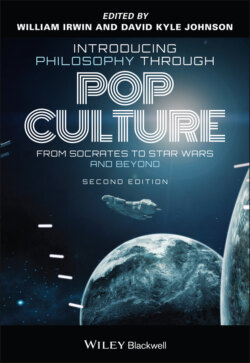Читать книгу Introducing Philosophy Through Pop Culture - Группа авторов - Страница 67
Оглавление
Part III
Metaphysics
Introduction
Metaphysics is the study of the nature of reality. While this often involves questions about the nature of the world, some of the most interesting contemporary questions about reality focus on our understanding of ourselves. We each believe that we have a mind, but what exactly is a mind, and how is it related to the brain? We each believe ourselves to be a person, but what exactly is a person and how can we be the same person over time? Do we really have free will? What about artificial intelligence? Could computers, one day soon, be conscious persons with the same rights as humans?
Questioning the nature of reality immediately leads to questions about the universe itself. What is it made of? What is its nature? And how can we know? At its base, the matter of the universe is quantum mechanical in nature – but what does that mean? In Chapter 8, Dara Fogel uses examples from Star Trek to argue that we might live in a computer simulation. If we do, a whole host of questions arise. Are we free? Are other persons conscious? Are you real? These questions are explored by Fogel and others in this part.
Metaphysical questions about persons often revolve around the mind. What exactly is it? Merely material? Something immaterial? Something in between? In Chapter 9, Dean Kowalski uses the adventures of the Marvel superhero Doctor Strange to give dualism – the belief in nonphysical souls interacting with physical bodies – serious consideration, and addresses some of its biggest problems. In Chapter 10, Matt Lawrence uses examples from The Matrix to show why dualism has fallen out of favor, and why the debate is now primarily between materialist theories like reductive materialism, eliminative materialism, emergentism, and functionalism. As it turns out, despite some tricky cases, the events of The Matrix Trilogy can be interpreted completely in a materialist light.
Other metaphysical questions about the person revolve around personal identity. Imagine yourself at age 10, and think how different you were. You look different now and you may have a different personality, yet you are the same person. How can that be? In Chapter 11, Jason Southworth uses the world of X‐Men to address this classic philosophical issue of identity through time. The character Wolverine provides us with a perfect opportunity to examine John Locke's (1632–1704) memory criterion for personal identity, because Wolverine has lost and regained memories multiple times. In addition, the character Jamie Madrox – who can copy and recombine himself – exemplifies Derek Parfit's view that physical continuity plays a role in maintaining personal identity.
One of the most troubling questions in metaphysics is about whether humans have free will. In Chapter 12, Grant Sterling uses Tolkien's The Hobbit to wrestle with whether Bilbo can be free if his life's actions were predetermined by the gods, and likewise whether we can be free if God has foreknowledge of our future actions. Tolkien, it seems, embraced a solution to this problem like that of the philosopher Boethius (477–524): the suggestion that God is timeless. In Chapter 13, Fitzpatrick and Johnson use Christopher Nolan's film Inception to explore arguments, grounded in science and philosophy, that we don't have free will. Do we have the ability to choose otherwise? Is such an ability required for free will? Inception provides the perfect “Frankfurt counterexample” and reveals why such examples don't actually invalidate the traditional understanding of free will or prove that free will is compatible with determinism.
Another central question of metaphysics revolves around the issue of machine consciousness. If we one day develop machines that behave like us, should we conclude that they have minds like we do? The HBO series Westworld imagines just such a day and thus provides the perfect framework to explore these questions. In Chapter 14, Lucia Carrillo González uses Westworld to explain the “Turing test” for determining machine consciousness along with the “Chinese room” objection to Turing's conclusion. In Chapter 15, Bradley Richards points out that, even if the hosts of Westworld do have minds, what it is like to be a host probably differs significantly from what it is like to be a human. The same might also be true of the androids that humanity one day builds.
This part concludes with one of philosophy's most perplexing metaphysical issues: the possibility of time travel. In Chapter 16 David Kyle Johnson explains the two major paradox‐free theories of time travel and applies them to the time travel that occurs in Avengers: Endgame. It turns out that Endgame falls prey to paradox. But, Johnson argues, that doesn't mean it’s a bad movie; it just means it could have been better.
